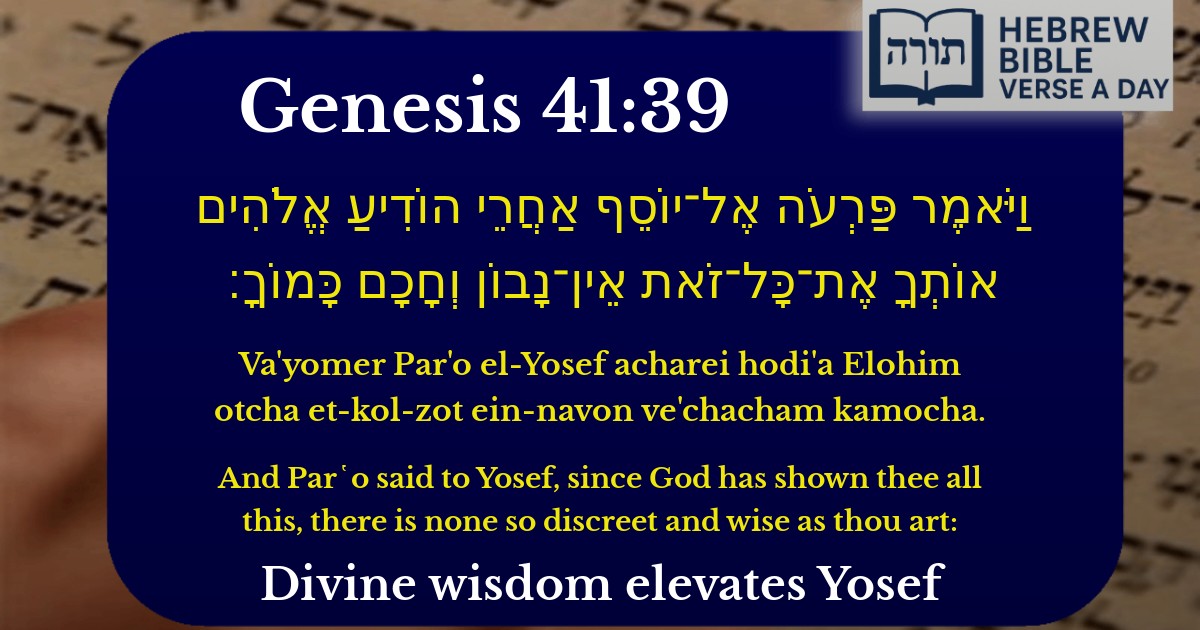Join Our Newsletter To Be Informed When New Videos Are Posted
Join the thousands of fellow Studends who rely on our videos to learn how to read the bible in Hebrew for free!
Hebrew Text
וַיֹּאמֶר פַּרְעֹה אֶל־יוֹסֵף אַחֲרֵי הוֹדִיעַ אֱלֹהִים אוֹתְךָ אֶת־כָּל־זֹאת אֵין־נָבוֹן וְחָכָם כָּמוֹךָ׃
English Translation
And Par῾o said to Yosef, since God has shown thee all this, there is none so discreet and wise as thou art:
Transliteration
Va'yomer Par'o el-Yosef acharei hodi'a Elohim otcha et-kol-zot ein-navon ve'chacham kamocha.
Hebrew Leining Text
וַיֹּ֤אמֶר פַּרְעֹה֙ אֶל־יוֹסֵ֔ף אַחֲרֵ֨י הוֹדִ֧יעַ אֱלֹהִ֛ים אוֹתְךָ֖ אֶת־כׇּל־זֹ֑את אֵין־נָב֥וֹן וְחָכָ֖ם כָּמֽוֹךָ׃
וַיֹּ֤אמֶר פַּרְעֹה֙ אֶל־יוֹסֵ֔ף אַחֲרֵ֨י הוֹדִ֧יעַ אֱלֹהִ֛ים אוֹתְךָ֖ אֶת־כׇּל־זֹ֑את אֵין־נָב֥וֹן וְחָכָ֖ם כָּמֽוֹךָ׃
🎵 Listen to leining
Parasha Commentary
📚 Talmud Citations
This verse is not quoted in the Talmud.


Pharaoh's Recognition of Divine Wisdom
The verse (Bereshit 41:39) describes Pharaoh acknowledging Yosef's wisdom as divinely inspired. Rashi explains that Pharaoh recognized Yosef's abilities were not merely human intellect but came from Hashem. This is evident in Pharaoh's phrasing "אַחֲרֵי הוֹדִיעַ אֱלֹהִים אוֹתְךָ" ("since God has shown you"), indicating a supernatural source of knowledge.
The Superiority of Yosef's Wisdom
Pharaoh declares, "אֵין־נָבוֹן וְחָכָם כָּמוֹךָ" ("there is none so discreet and wise as you"). The Kli Yakar notes that Pharaoh's advisors—despite their own wisdom—could neither interpret his dreams nor propose solutions, whereas Yosef did both. This demonstrates that true wisdom comes from connection to the Divine.
Distinction Between "Navon" and "Chacham"
Pharaoh's Public Declaration
The Midrash (Bereshit Rabbah 90:3) highlights that Pharaoh's proclamation was a kiddush Hashem (sanctification of God's name), as he attributed Yosef's wisdom to Divine revelation. This public acknowledgment by a gentile king underscores the impact of Yosef's righteousness even in exile.